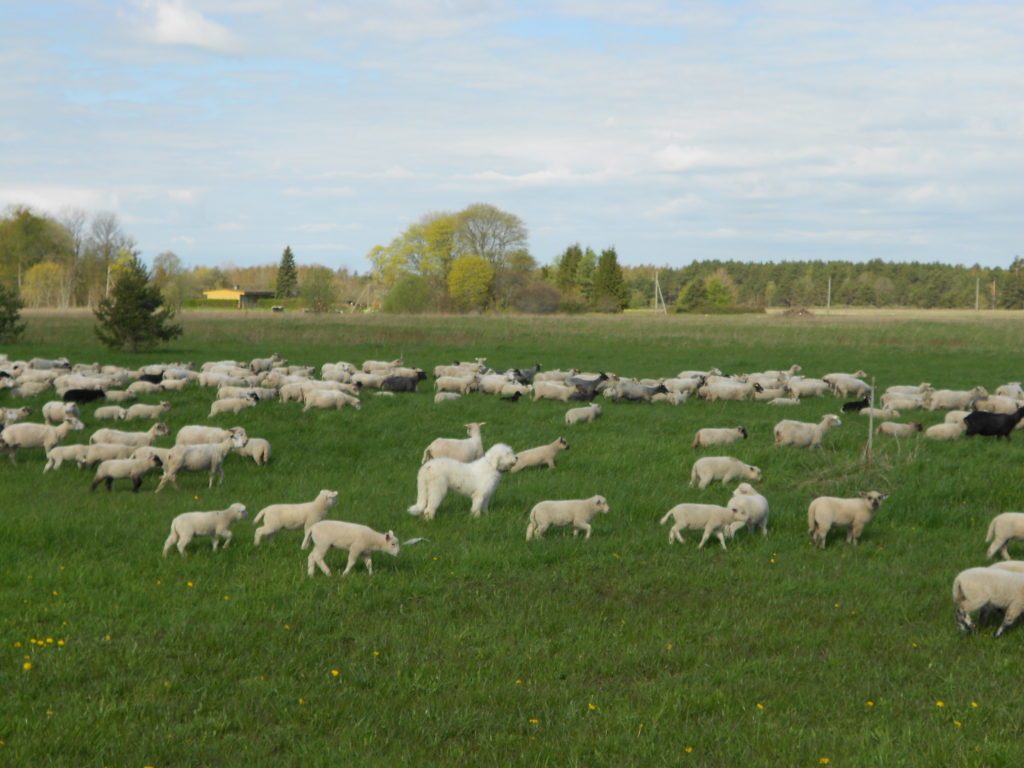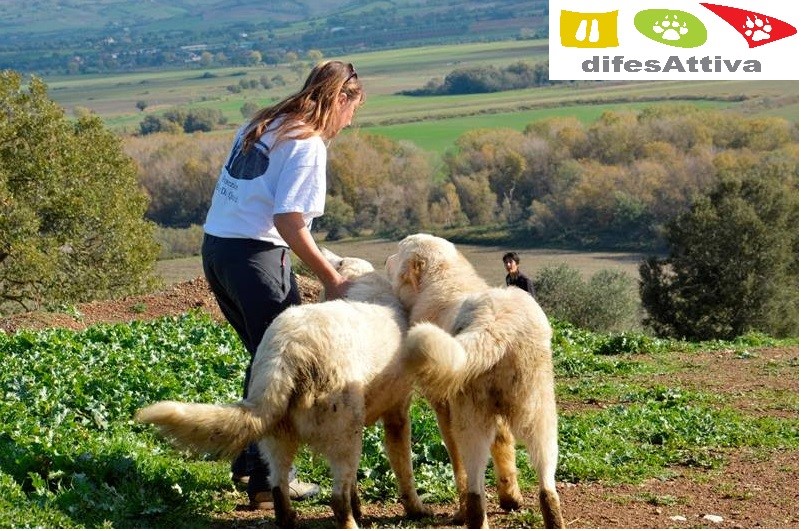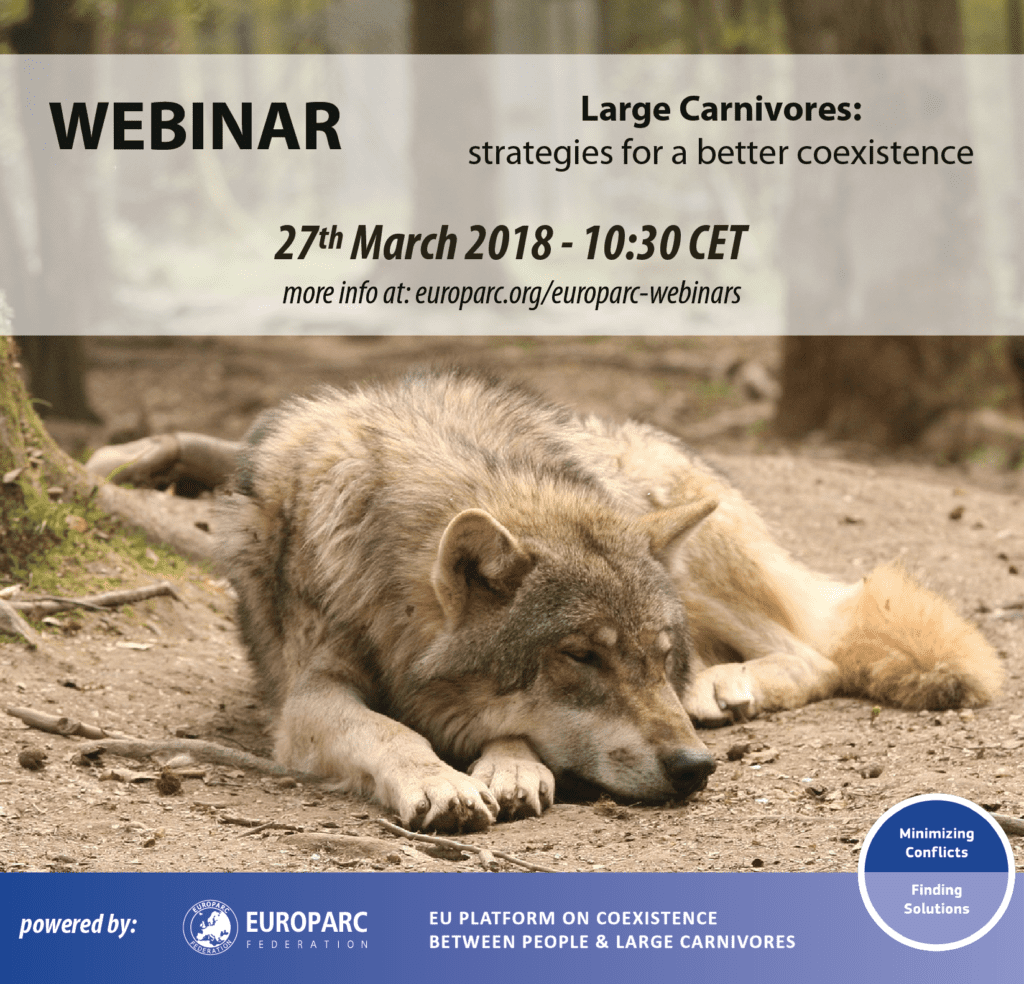Webinar: Large Carnivores – Strategies for a better coexistence
Large Carnivores: strategies for a better coexistence
- 27.03.2018 – 10:30 CET
- Register here
While wildlife return in Europe is seen by many as a great conservation success, it brings some new challenges too.
For centuries, the wolf, the bear, the lynx and wolverine, were chased and expelled from their natural habitats – and almost extinct in many European places. However, the current land use in Europe, habitat improvement and increase of prey species, backed by the legal protection large carnivores have in some countries, brought a new opportunity for them to come back – raising potential conflicts between farmers and livestock producers, hunters, local authorities, protected areas, and NGOs.
The ”us or them” argument seems no longer valid. It is time to find joint solutions andwork together for a better coexistence between people and large carnivores.
EUROPARC believes Protected Areas have an important role to play, not only in safeguarding these species and their habitats but also in mediating dialogue with local authorities, supporting farmers and livestock producers and working with local communities.
There are many successful examples that demonstrate how conflicts can be minimised through prevention, education, training and awareness raising. In this webinar, we bring you successful strategies that were implemented by Protected Areas and NGOs in Estonia, Italy and Portugal.
The webinar will be moderated by Valeria Salvatori, co-author of the European Commission guidance document “Guidelines for population-level management plans for large carnivores”. Since 1998, Valeria has been working with large carnivores in many European projects in different regions, and she is a member of the Large Carnivore Initiative for Europe (IUCN Task force of the SSC).
The webinar is co-organised by the EU Platform on Coexistence between People and Large Carnivores – an assembly of organisations representing different interests groups brought together to promote and find solutions to minimise conflict, and to share knowledge and best practice. EUROPARC Federation is an active member of the Platform, representing the perspective of European Protected Areas.

Case Study 1: Management of conflicts between large carnivores and farmers in Estonia
By Tõnu Talvi, Environmental Board of Estonia
Large carnivores (wolf, brown bear and lynx) are common throughout Estonia. Damage caused to livestock (mainly on sheep, occasionally on dogs, goats, cattle and horses) and apiaries are the primary reason for the human-large predator conflict. To reduce the conflict and build tolerance, we developed a depredation and damage prevention measures compensation programme since 2009. Main priorities are to improve husbandry practices, to (re)introduce different prevention measures, to improve farmers responsibility and training, to inform and educate the general community. In the programme, different effective measures (substantially improved electric fences, night enclosures, livestock guarding dogs etc) are compensated by the state.
Tõnu Talvi is Chief Specialist of Nature Conservation in the Environmental Board of Estonia and among other topics, he is responsible for the management of Large Carnivores, regarding human conflicts and damage compensation.

Case Study 2: Active collaboration with livestock owners to mitigate wolf impact in Central Italy
By Luisa Vielmi, NGO DifesAttiva, Italy
Mitigating the impacts of wolf on livestock production was the main objective of the MedWolf LIFE project, whose actions took place in the province of Grosseto in Italy, and in the districts of Guarda and Castelo Branco in Portugal. Despite different regions, similar damage prevention measures have been implemented, with the focus on training and giving guarding dogs to livestock producers. The NGO DifesAttiva itself was created within the project – its members are the local farmers who received guarding dogs – and it works to ensure the welfare of puppies (so that producers in other Italian regions can also receive a guarding dog). To establish a stronger network of local producers, and create a quality brand for local production are the main objectives of the NGO.
Luisa Vielmi is a biologist and professional dog handler with experience on wolf ecology. She is technician at DifesAttiva and at the Farmer’s Union Coldiretti Grosseto.

How to join?
Webinars are open not only to EUROPARC members – but to everyone with an interest in Protected Areas. Participation is free but registration is necessary. Keep in mind places are limited to 100 participants, and once these number is reached, you will be directed to a virtual “waiting room”.
You can join in from anywhere: you will just need a device with internet connection.
